DESCRIPTION Refer to DTC P2195 (See page
 ). ).
HINT:
- Although the DTC titles say oxygen sensor, these DTCs relate to the Air-Fuel Ratio (A/F) sensor.
- Sensor 1 refers to the sensor mounted in front of the Three-Way Catalytic Converter (TWC) and located near the engine assembly.
- When one of these DTCs is stored, the ECM enters fail-safe mode. The ECM
turns off the A/F sensor heater in fail-safe mode. Fail-safe mode
continues until the ignition switch is turned off.
- The ECM provides a pulse width modulated control circuit to adjust the
current through the heater. The A/F sensor heater circuit uses a relay
on the +B side of the circuit.
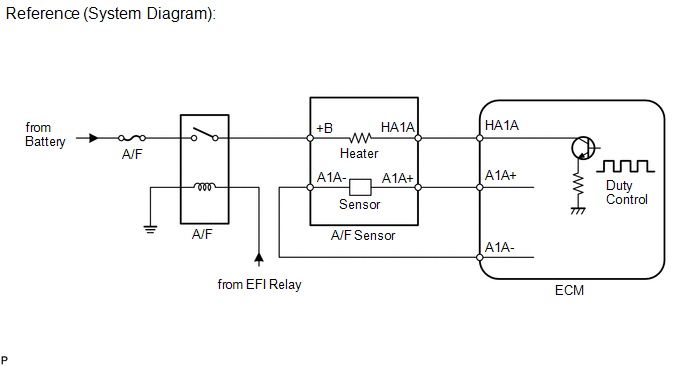
|
DTC No. | DTC Detection Condition |
Trouble Area | | P0031
P0051 | Air-Fuel Ratio (A/F) sensor heater current is less than 0.8 A
(1 trip detection logic) |
- Open in A/F sensor heater circuit
- A/F sensor heater (for Sensor 1)
- Integration relay
- ECM
| | P0032
P0052 | Air-Fuel Ratio (A/F) sensor heater current failure
(1 trip detection logic) |
- Short in A/F sensor heater circuit
- A/F sensor heater (for Sensor 1)
- Integration relay
- ECM
| | P101D
P103D | The heater current is higher than the specified value while the heater is not operating (1 trip detection logic). |
- Open or short in A/F sensor heater circuit
- ECM
| MONITOR DESCRIPTION
The
ECM uses information from the Air-Fuel Ratio (A/F) sensor to regulate
the air-fuel ratio and keep it close to the stoichiometric level. This
maximizes the ability of the Three-Way Catalytic Converter (TWC) to
purify the exhaust gases. The A/F sensor detects
oxygen levels in the exhaust gas and transmits the information to the
ECM. The inner surface of the sensor element is exposed to the outside
air. The outer surface of the sensor element is exposed to the exhaust
gas. The sensor element is made of platinum coated zirconia and includes
an integrated heating element. The zirconia
element generates a small voltage when there is a large difference in
the oxygen concentrations between the exhaust gas and outside air. The
platinum coating amplifies this voltage generation. The
A/F sensor is more efficient when heated. When the exhaust gas
temperature is low, the sensor cannot generate useful voltage signals
without supplementary heating. The ECM regulates the supplementary
heating using a duty-cycle approach to adjust the average current in the
sensor heater element. If the heater current is outside the normal
range, the signal transmitted by the A/F sensor becomes inaccurate. As a
result, the ECM is unable to regulate the air-fuel ratio properly. When
the current in the A/F sensor heater is outside the normal operating
range, the ECM interprets this as a malfunction in the sensor heater and
stores a DTC. MONITOR STRATEGY |
Related DTCs | P0031: A/F sensor heater (for Bank 1) open/short (Low electrical current)
P0032: A/F sensor heater (for Bank 1) open/short (High electrical current)
P0051: A/F sensor heater (for Bank 2) open/short (Low electrical current)
P0052: A/F sensor heater (for Bank 2) open/short (High electrical current)
P101D: A/F sensor heater (for Bank 1) performance P103D: A/F sensor heater (for Bank 2) performance | |
Required Sensors/Components (Main) | A/F sensor heater | |
Required Sensors/Components (Related) | - | |
Frequency of Operation | Continuous | |
Duration | 10 seconds: P0031 and P0051
10.24 seconds: P0032 and P0052 1 second: P101D and P103D | |
MIL Operation | Immediate | |
Sequence of Operation | None | TYPICAL ENABLING CONDITIONS P0031 and P0051 |
Monitor runs whenever following DTCs not stored | P101D, P103D (Air fuel ratio sensor heater) | |
One of following conditions met | - | |
A. All of following conditions met | - | |
Battery voltage | 10.5 V or higher | |
Time after heater on | 5 seconds or more | |
Active heater OFF control | Not operating | |
Active heater ON control | Not operating | |
Air fuel ratio sensor heater duty-cycle | 10% or more | |
B. All of following conditions met | - | |
Output duty cycle | 30% or more | P0032 and P0052 |
Monitor runs whenever following DTCs not stored | None | |
Battery voltage | 10.5 V or higher | |
Time after heater on | 5 seconds or more | |
Active heater OFF control | Not operating | |
Active heater ON control | Not operating | |
Air fuel ratio sensor heater duty-cycle | More than 0% | P101D and P103D |
Monitor runs whenever following DTCs not stored | P0031, P0051 (Air fuel ratio sensor heater) | |
Battery voltage | 10.5 V or higher | |
Output duty cycle | below 60% | |
Active heater OFF control | Not operating | |
Active heater ON control | Not operating | TYPICAL MALFUNCTION THRESHOLDS P0031 and P0051 |
Air fuel ratio sensor heater current | Below 0.8 A | P0032 and P0052 |
All of following condition met | - | |
Air fuel ratio sensor heater output |
ON | | Hybrid IC high current limiter monitor |
Fail | P101D and P103D |
All of following condition met | - | |
Air fuel ratio sensor heater OFF current |
Higher than 11 A | | Hybrid IC high current limiter monitor input |
Fail | COMPONENT OPERATING RANGE |
A/F sensor heater current | 0.8 A or more | CONFIRMATION DRIVING PATTERN
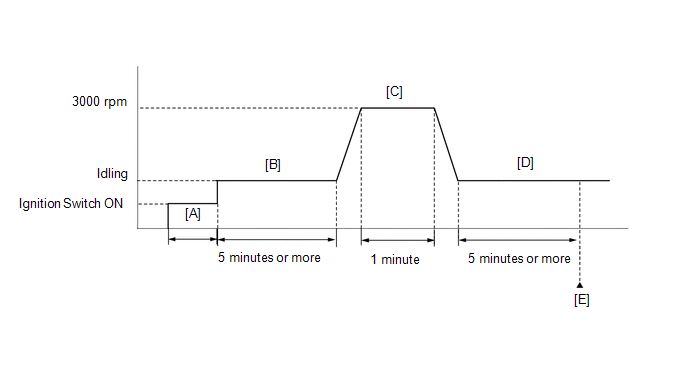
- Connect the Techstream to the DLC3.
- Turn the ignition switch to ON and turn the Techstream ON.
- Clear DTCs (even if no DTCs are stored, perform the clear DTC operation).
- Turn the ignition switch off and wait for at least 30 seconds.
- Turn the ignition switch to ON and turn the Techstream on [A].
- Start the engine and idle it for 5 minutes or more [B].
- With the vehicle stationary, depress the accelerator pedal and maintain an engine speed of 3000 rpm for 1 minute [C].
- Idle the engine for 5 minutes or more [D].
- Enter the following menus: Powertrain / Engine and ECT / Trouble Codes [E].
- Read the pending DTCs.
HINT:
- If a pending DTC is output, the system is malfunctioning.
- If a pending DTC is not output, perform the following procedure.
- Enter the following menus: Powertrain / Engine and ECT / Utility / All Readiness.
- Input the DTC: P0031, P0032, P0051, P0052, P101D or P103D.
- Check the DTC judgment result.
|
Tester Display |
Description |
|
NORMAL |
- DTC judgment completed
- System normal
|
|
ABNORMAL |
- DTC judgment completed
- System abnormal
|
|
INCOMPLETE |
- DTC judgment not completed
- Perform driving pattern after confirming DTC enabling conditions
|
|
N/A |
- Unable to perform DTC judgment
- Number of DTCs which do not fulfill DTC preconditions has reached ECU memory limit
|
- If the judgment result shows INCOMPLETE or N/A, perform steps [B] through [E] again.
- If no pending DTC is output, perform a universal trip and check for permanent DTCs (See page
 ). ).
HINT:
- If a permanent DTC is output, the system is malfunctioning.
- If no permanent DTC is output, the system is normal.
WIRING DIAGRAM Refer to DTC P2195 (See page
 ). ). CAUTION / NOTICE / HINT
HINT:
PROCEDURE |
1. | INSPECT AIR FUEL RATIO SENSOR (HEATER RESISTANCE) |
(a) Inspect the air fuel ratio sensor (See page
 ). ). HINT: Perform "Inspection After Repair" after replacing the air fuel ratio sensor (See page
 ). ).
| NG |  |
REPLACE AIR FUEL RATIO SENSOR |
|
OK |
 | |
| 2. |
CHECK TERMINAL VOLTAGE (+B OF A/F SENSOR) |
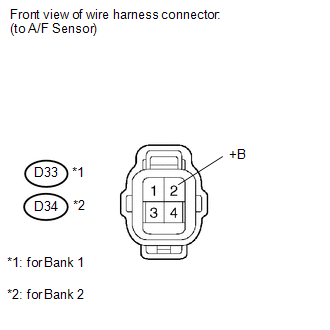 (a) Disconnect the A/F sensor connector.
(b) Turn the ignition switch to ON. (c) Measure the voltage according to the value(s) in the table below.
Standard Voltage: |
Tester Connection | Switch Condition |
Specified Condition | |
D33-2 (+B) - Body ground |
Ignition switch ON | 11 to 14 V | |
D34-2 (+B) - Body ground |
Ignition switch ON | 11 to 14 V | Result |
Result | Proceed to | |
NG | A | |
OK | B |
| B |
 | GO TO STEP 5 |
|
A |
 | |
| 3. |
INSPECT INTEGRATION RELAY (A/F) | (a) Remove the integration relay from the engine room relay block.
(b) Inspect the A/F fuse. (1) Remove the A/F fuse from the integration relay.
(2) Measure the resistance according to the value(s) in the table below.
Standard Resistance: |
Tester Connection | Condition |
Specified Condition | |
A/F fuse | Always |
Below 1 Ω | (3) Reinstall the A/F fuse.
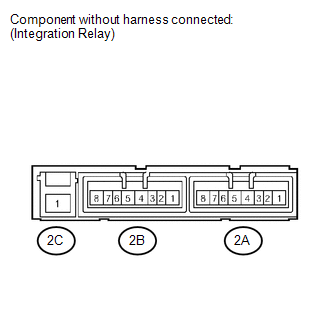 (c) Inspect the integration relay (A/F).
(1) Measure the resistance according to the value(s) in the table below.
Standard Resistance: |
Tester Connection | Condition |
Specified Condition | |
2C-1 - 2A-4 | No battery voltage applied to terminals 2A-2 and 2A-3 |
10 kΩ or higher | |
Battery voltage applied to terminals 2A-2 and 2A-3 |
Below 1 Ω |
| NG |
 | REPLACE INTEGRATION RELAY (A/F) |
|
OK |
 | |
| 4. |
CHECK HARNESS AND CONNECTOR (INTEGRATION RELAY - A/F SENSOR AND BODY GROUND) |
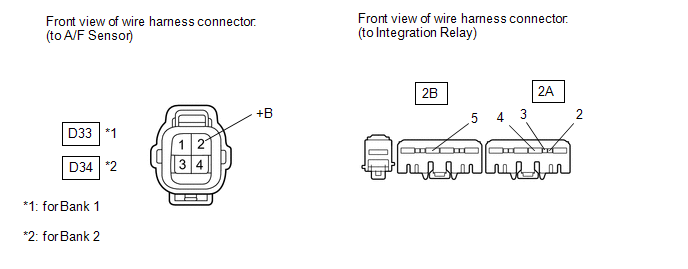 (a) Disconnect the A/F sensor connector.
(b) Remove the integration relay from the engine room relay block. (c) Measure the resistance according to the value(s) in the table below.
Standard Resistance: |
Tester Connection | Condition |
Specified Condition | |
D33-2 (+B) - 2A-4 | Always |
Below 1 Ω | |
D34-2 (+B) - 2A-4 | Always |
Below 1 Ω | |
2A-2 - 2B-5 | Always |
Below 1 Ω | |
2A-3 - Body ground | Always |
Below 1 Ω | |
D33-2 (+B) or 2A-4 - Body ground |
Always | 10 kΩ or higher | |
D34-2 (+B) or 2A-4 - Body ground |
Always | 10 kΩ or higher | |
2A-2 or 2B-5 - Body ground |
Always | 10 kΩ or higher |
| OK |
 | CHECK ECM POWER SOURCE CIRCUIT |
| NG |
 | REPAIR OR REPLACE HARNESS OR CONNECTOR |
| 5. |
CHECK HARNESS AND CONNECTOR (A/F SENSOR - ECM) |
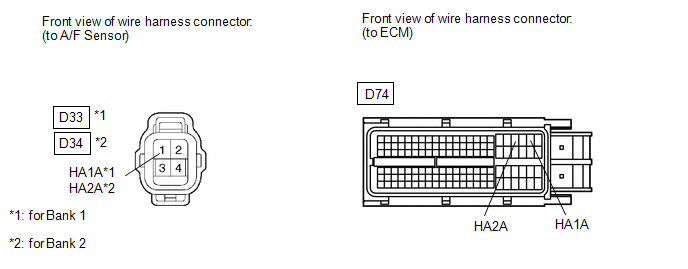 (a) Disconnect the A/F sensor connector.
(b) Disconnect the ECM connector. (c) Measure the resistance according to the value(s) in the table below.
Standard Resistance: |
Tester Connection | Condition |
Specified Condition | |
D33-1 (HA1A) - D74-22 (HA1A) |
Always | Below 1 Ω | |
D34-1 (HA2A) - D74-20 (HA2A) |
Always | Below 1 Ω | |
D33-1 (HA1A) or D74-22 (HA1A) - Body ground |
Always | 10 kΩ or higher | |
D34-1 (HA2A) or D74-20 (HA2A) - Body ground |
Always | 10 kΩ or higher |
| NG |
 | REPAIR OR REPLACE HARNESS OR CONNECTOR |
|
OK |
 | |
| 6. |
CHECK WHETHER DTC OUTPUT RECURS | (a) Connect the Techstream to the DLC3.
(b) Turn the ignition switch to ON. (c) Turn the Techstream on.
(d) Clear DTCs (See page  ). ). (e) Start the engine.
(f) Drive the vehicle in accordance with the driving pattern described in the Confirmation Driving Pattern.
(g) Read the output pending DTCs using the Techstream. Result |
Result | Proceed to | |
No pending DTC is output |
A | | Pending DTC P0031, P0032, P0051, P0052, P101D or P103D is output |
B |
| A |
 | CHECK FOR INTERMITTENT PROBLEMS |
| B |
 | REPLACE ECM | | 



